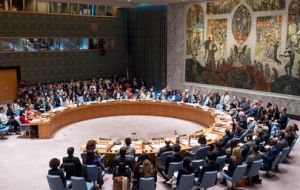MercoPress. South Atlantic News Agency
Uruguay voted in as non permanent member of UN Security Council
 Applause and cheers broke out in the assembly hall after first results showed Senegal had won the largest share, 187 votes followed by Uruguay with 185.
Applause and cheers broke out in the assembly hall after first results showed Senegal had won the largest share, 187 votes followed by Uruguay with 185. In one round of voting the United Nations General Assembly on Thursday elected Egypt, Japan, Senegal, Ukraine and Uruguay to serve as non-permanent members on the Security Council for two-year terms beginning on 1 January 2016.
New members Egypt, Japan, Senegal, Ukraine and Uruguay will serve until 31 December 2017. The last time Uruguay had a seat at the Security Council was in 1965/66.
Applause and cheers broke out in the assembly hall after first results showed Senegal had won the largest share, picking up 187 votes followed by Uruguay with 185. Japan picked up 184 votes, Egypt won 179 and Ukraine 177 in the 193-nation assembly.
The five overall seats available for election in 2015, distributed regionally, were: two seats for the African Group (currently held by Chad and Nigeria); one seat for the Asia-Pacific Group (currently held by Jordan); one seat for the Group of Latin American and Caribbean States (currently held by Chile); and one seat for the Eastern European Group (currently held by Lithuania).
The Western European and Others Group is contesting no seats this year, as its two seats (currently held by New Zealand and Spain) are up for election every even calendar year.
The five permanent Council members, which each wield the power of veto, are China, France, Russia, the United Kingdom and the United States. The non-permanent members that will remain on the Council until the end of 2016 are Angola, Malaysia, New Zealand, Spain and Venezuela.
Under the UN Charter, the Security Council has primary responsibility for the maintenance of international peace and security. Each of the Council’s members has one vote. Under the Charter, all UN Member States are obligated to comply with Council decisions.
The Security Council takes the lead in determining the existence of a threat to the peace or act of aggression. It calls upon the parties to a dispute to settle it by peaceful means and recommends methods of adjustment or terms of settlement. In some cases, the Security Council can resort to imposing sanctions or even authorize the use of force to maintain or restore international peace and security.
The Security Council also recommends to the General Assembly the appointment of the Secretary-General and the admission of new Members to the United Nations. And, together with the General Assembly, it elects the judges of the International Court of Justice.




Top Comments
Disclaimer & comment rules-

-

-

Read all commentsGo Charruas!
Oct 16th, 2015 - 07:36 pm 0At least the grown-ups have a veto on the “children” turning their infantile self-serving 'proposals' into reality.
Oct 16th, 2015 - 09:34 pm 0May that never change.
#2 ChrisR
Oct 17th, 2015 - 02:25 am 0“Infantile self-serving proposals...”
Infantile, dismissive words, Chris.
A perfect case of the pot calling the kettle black.
Commenting for this story is now closed.
If you have a Facebook account, become a fan and comment on our Facebook Page!